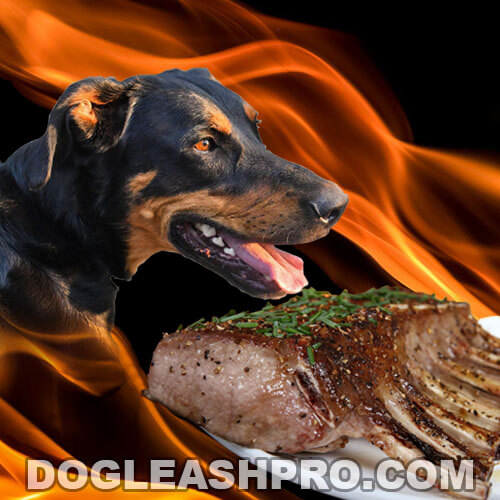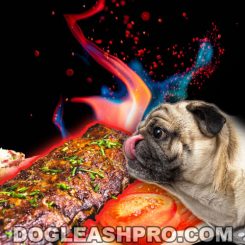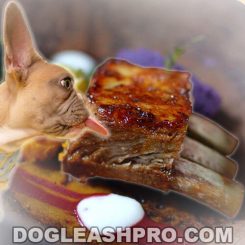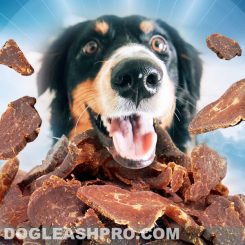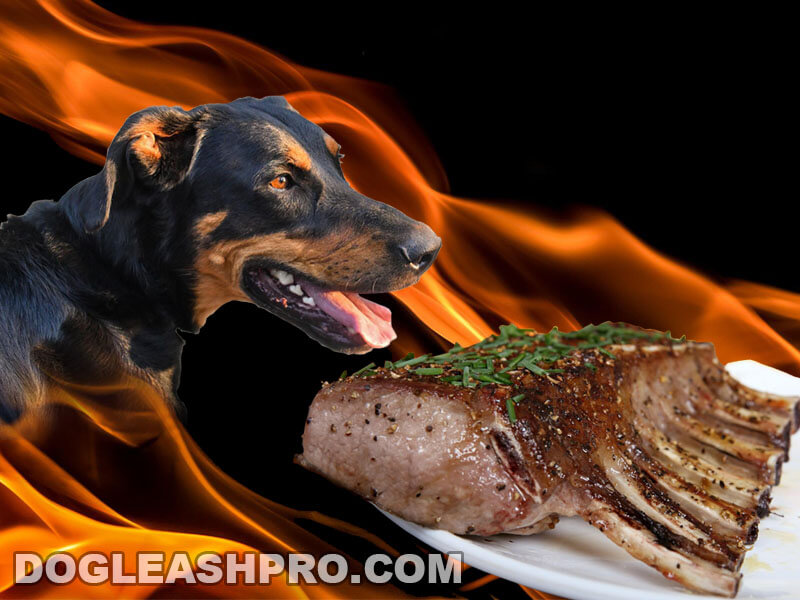
Can dogs eat Beef Rib Bones? Yes, dogs can eat Beef Rib Bones as long as they are raw and consumed under your careful supervision. Please note that some raw Beef Rib Bones may contain bacteria or salmonella so it can be risky feeding dogs raw bones. If you do, only give your dogs large Beef Rib Bones since smaller ones can be a choking hazard. Avoid feeding your dogs cooked Beef Rib Bones since they can easily splinter and cause serious internal damage and bleeding. Lastly, do not feed your dogs Beef Rib Bones from table scraps.
In this article, we’ll discuss everything you need to know about Rib Bones and dogs. We’ll also let you know where you can find safer alternatives to Rib Bones if you have a canine companion that is an aggressive chewer or loves to chew!
Table of Contents
Can dogs have Beef Rib Bones?
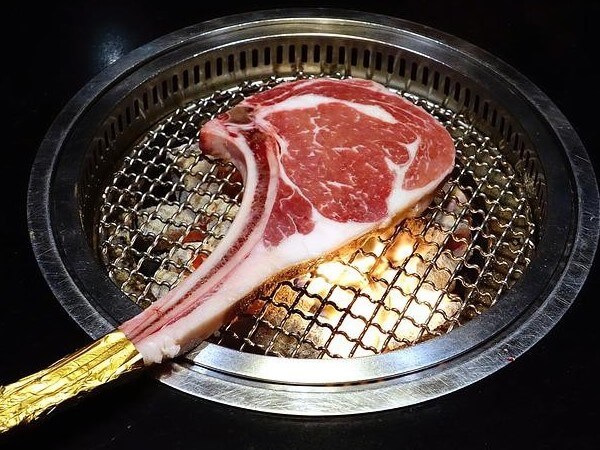
Yes, generally dogs can have Beef Rib Bones, but it also depends on the following:
- Raw Beef Rib Bones vs cooked Beef Rib Bones.
- Size of the bones.
- Size of your dog.
- Age of your dog.
- Shape and size of your dog’s jaw and muzzle.
- Your dog’s prior experience with chewing bones (Beef Rib Bones or others).
- Did you buy the raw Beef Rib Bones from a reputable grocery store that values health and safety as their number one priority so that there’s minimal risk of salmonella or bacteria on the bones?
In the next few sections, we’ll go through in detail the above list to help you determine whether the Beef Rib Bones you have in your hand is safe to give your canine companions.
Are Beef Rib Bones safe for dogs?
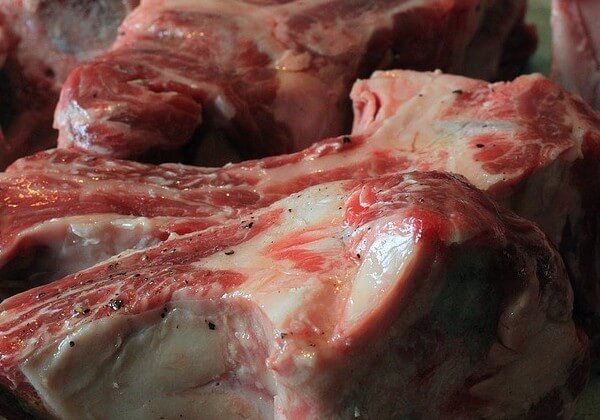
If you’re wondering, “Is Beef Rib Bones safe for dogs?” the answer is yes. Beef Rib Bones are generally safe for dogs, however, there are cases when they are not safe for dogs.
Let’s first start with why Beef Rib Bones are safe for doggy consumption.
RECOMMENDED: Can Dogs Eat Pork Rib Bones?
Beef Rib Bones safe for dogs?
When it comes to Beef Rib Bones, raw Beef Rib Bones are the safest for doggy consumption. That’s because raw Beef Rib Bones contain plenty of nutrients and B-vitamins that can benefit your dog’s joint health and overall health.
However, before you feed your pooch Beef Rib Bones, be sure that they already know or understand how to chew the bones. If you know your furry friend has had a previous bad experience or problems with chewing bones, we highly recommend that you do not give them the bone.
That’s because not knowing how to chew the bones properly can lead to choking or internal bleeding or tears.
In general, Beef Rib Bones with only a small amount of muscles and connective tissues on them are relatively safe for doggy consumption because there’s a lower chance of them containing salmonella, bacteria, or other contaminants on them.
Now that we know raw Beef Rib Bones are safe for dogs, what about the Beef Ribs themselves? Is the meat on the Beef Rib Bones safe for dogs?
Are Beef Ribs safe for dogs?
Yes, Beef Ribs are safe for dogs as long as the meat is fully cooked without any added seasoning or flavorings. Cooked meat ensures that the meat is free of harmful contaminants and bacteria that could make your canine friends sick. Cooked Beef Rib meat is also soft which is easier for your dogs to chew and digest.
Undoubtedly, Beef Rib meat is full of protein and nutrients. If your pooch is on a raw food diet, you can feed him some raw Beef Rib meat. Be extra careful when feeding your pooch raw meat since it may contain bacteria or salmonella. If not, you can feed them the cooked Beef Rib meat.
When are Beef Rib Bones not safe for doggy consumption?
Beef Rib Bones are not safe for dogs when they are cooked. It doesn’t matter if you boil, fry, or barbeque the Beef Rib Bones, they are simply not safe or good for dogs.
Here’s why:
First, when you cook the Beef Rib Bones, it removes the nutrients from the bones. Your four-legged friends will not receive any nutrients from gnawing or chewing the bones.
Second, when the Beef Rib Bones are cooked, the bone loses its solidity and becomes quite dry. This causes the Beef Rib Bones to become hard and brittle so they break more easily when your dogs chew or gnaw them.
The bones will break or splinter upon being chewed on and there are shards that can tear your dog’s lip, mouth, and tongue. If your pooch manages to swallow the shards, they can tear your dog’s throat and intestinal tract lining.
All of this can cause internal bleeding and may require surgery. In the worst-case scenario, this can lead to sepsis.
Not only will cooked Beef Rib Bones cause internal bleeding, but also it can be a choking hazard. The sharp shards and splinters can get lodged in your dog’s throat or esophagus when he is trying to swallow. As a result, he may start to cough. If he’s not able to get enough oxygen, he will collapse.
If you suspect that your pup is choking, please bring him to the doggy emergency hospital right away. This requires immediate medical attention.
See also: What Can Dogs Drink Besides Water?
It is possible that the shards may also tear your dog’s intestinal lining and this can cause internal bleeding, intestinal obstruction, or gastrointestinal trauma.
Here are some signs and symptoms of a bone or shard lodged in your dog’s throat or intestines:
- Vomiting.
- Coughing.
- Drooling excessively.
- Rubbing neck or head along the ground.
- Lethargy.
- Abdominal pain.
- Bloody stool.
Again, if you suspect your pooch may have an intestinal obstruction or internal bleeding, contact your vet right away. This requires immediate attention as it is life-threatening and may require surgery.
RECOMMENDED: Dog Vomit Color Guide
Aside from the danger of giving your dogs cooked bones, there are also other reasons why Beef Rib Bones may not be safe for your dogs.
Before giving your furry family member Beef Rib Bones, it’s important to take into consideration their age. For instance, if you have a few-month-old puppy, then it’s best not to give them Beef Rib Bones to chew or gnaw on.
That’s because puppies have very sensitive and tiny teeth and their jaw strength is weak at best. Raw Beef Rib Bones are hard and there is a high chance that your puppy may damage or break his teeth while chewing on the bone.
Puppies also have smaller mouths and jaws and the size of the Beef Rib Bones is considered much larger than their mouth and jaws so your pups will have a difficult time chewing them.
Fortunately, in most cases, your small puppy will become disinterested when they try to chew a hard Beef Rib Bone and will not bother with it. If he tries to chew the bone and is experiencing tooth pain, that may be enough to discourage him from chewing that bone again.
No matter how old your canine friends are, be careful with how much of the bones you’re feeding them. Some dogs may experience constipation if they eat the whole Beef Rib Bones. For most dogs, feeding them a smaller amount of Beef Rib Bones is best.
RELATED: How Many Times A Day Should A Puppy Poop?
Lastly, it is important to keep in mind that as with all raw meat and bones, they may contain bacteria, salmonella, or other contaminants that could potentially cause food poisoning and make your fido sick. Anytime you’re feeding your pooch raw meat or bones such as raw Beef Rib Bones, your pooch is at risk of getting sick.
So, can dogs eat Beef Rib Bones safely?
As we can see, there are many factors that can affect whether the Beef Rib Bones are safe for dogs. Before you give your pooch a Beef Rib Bone, consider his age and size and make sure the bone is raw.
As always, observe your pooch carefully when he’s chewing on the Beef Rib Bones. After chewing on the Beef Rib Bones, keep a close eye on him for the next 5 to 6 hours to see if he reacts negatively from it or if he’s having any digestive issues.
Are Beef Rib Bones good for dogs?
Yes, raw Beef Rib Bones are good for dogs. Compared to cooked Beef Rib Bones, raw Beef Rib Bones are softer and are less of a risk.
In addition, raw Beef Rib Bones with the marrow intact are also good for dogs. That’s because the marrow in the raw Beef Rib Bones contains tons of nutrition such as B-vitamins and iron that is great for your canine friends.
The connective tissues attached to the Beef Rib Bones can also help improve your dog’s joint health since it contains both chondroitin and natural glucosamine.
Eating food that contains chondroitin is great for dogs with joint pain because it can help to increase both lubricant and cartilage cell production. Chondroitin helps to repair and maintain your dog’s joint and as a result, it will help to relieve joint pain.
Similar to chondroitin, natural glucosamine found in the connective tissues of the Beef Rib Bones can help to reduce joint pain caused by conditions like hip dysplasia or arthritis.
Aside from that, raw Beef Rib Bones are great for both heavy and chewers alike. Your K9 companions will get a good jaw exercise out of chewing the bones. Best of all, they will receive some nutritional benefits from them as well.
Not only that, but chewing Beef Rib Bones can help to remove plaque and tartar buildup on your dog’s teeth. Chewing or gnawing the bones can help to massage their gums, prevent tooth and gum issues, and overall leave your dog’s teeth sparkly white and clean.
Plus, chewing the Beef Rib Bones will keep your furry friends busy, fully occupied, and entertained. They will try to tear off the muscles and connective tissues from the Beef Rib Bones and this will keep them occupied for hours. Not only will this chewing activity provide them with a good jaw workout, but also it will help to prevent boredom and destructive behaviors.
While Beef Rib Bones are good for dogs if they are raw, we can’t emphasize enough how important it is to closely monitor and supervise your canine friends when they are chewing the Beef Rib Bones.
Can dogs eat cooked Beef Rib Bones?
No, dogs should not eat cooked Beef Rib Bones. Can dogs have cooked Beef Rib Bones? Absolutely not. As mentioned above, when the Beef Rib Bones are cooked, they become quite dry and hard. This makes the bone easier to break when your canine friends are chewing or gnawing it.
The problem with cooked Beef Rib Bones is that once they break, they splinter and you can expect sharp shards. These shards can cause tears to your dog’s lips, tongue, and mouth which leads to bleeding.
In addition, the cooked Beef Rib Bones can be a choking hazard. When your furry friend isn’t careful and accidentally swallows the bone, they can choke from it. The sharp shards or splinters may get lodged in his throat or esophagus and this may block his airway and prevent him from breathing properly.
Not only that, the shards can tear the lining in his throat or esophagus.
Once the splinters from the cooked Beef Rib Bones make their way down into the dog’s stomach or intestines, they become what is known as “foreign bodies.” The shards will not only tear the intestinal lining wall, but also they can get stuck in your dog’s gastrointestinal tract. This causes intestinal obstruction and can affect your dog’s gastrointestinal system.
Thus, it is best that you do not feed your four-legged friends cooked Beef Rib Bones.
You may be interested in: Can Dogs Eat Brisket?
Can dogs eat raw Beef Rib Bones?
Yes, dogs can eat raw Beef Rib Bones. If you allow your furry friends to chew or gnaw Beef Rib Bones, it’s best to give them raw bones. That’s because raw Beef Rib Bones are softer since they contain moisture in them.
If there is muscle or connective tissues on the bones, that’s even better. The connective tissues attached to the Beef Rib Bones are great for your dog’s joint health since they contain natural glucosamine and chondroitin.
Finally, some raw Beef Rib Bones may have marrow in them. Marrow is a great source of iron and B-vitamins for your furry family members.
DISCLAIMER: THIS WEBSITE DOES NOT PROVIDE MEDICAL ADVICE
The information, including but not limited to, text, graphics, images and other material contained on this website are for informational purposes only. No material on this site is intended to be a substitute for professional veterinary advice, diagnosis, or treatment. Always seek the advice of your veterinarian or other qualified health care provider with any questions you may have regarding dietary needs.
Resources:
https://pubmed.ncbi.nlm.nih.gov/19814770/
https://vcahospitals.com/know-your-pet/ingestion-of-foreign-bodies-in-dogs

With over five years of specialized experience as an animal writer, my expertise lies in dog nutrition, health, behavior, grooming, and training. I am dedicated to delivering helpful and informative content that caters to the well-being of our furry friends. My primary goal is to empower pet owners with knowledge and ensure our canine companions thrive in health and happiness. In my free time, I love volunteering at local dog rescue centers.
